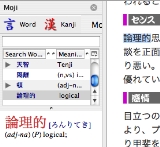
Moji extension
Encyclopedia
Moji is a free
, open source
, cross-platform
Japanese and Chinese dictionary for Mozilla Firefox, Mozilla Thunderbird
and SeaMonkey
written by Erwan Loisant and Gerald Vogt. It is also an extension that makes it possible to search much bigger free dictionary database
s. Moji was designed as a tool to help foreigners who are learning Japanese read Web pages, and it therefore allows search of hiragana
, katakana
and kanji
terms, but not of rōmaji
. The program is compatible with Mac OS X
, Microsoft Windows
, and Linux
.
Free software
Free software, software libre or libre software is software that can be used, studied, and modified without restriction, and which can be copied and redistributed in modified or unmodified form either without restriction, or with restrictions that only ensure that further recipients can also do...
, open source
Open source
The term open source describes practices in production and development that promote access to the end product's source materials. Some consider open source a philosophy, others consider it a pragmatic methodology...
, cross-platform
Cross-platform
In computing, cross-platform, or multi-platform, is an attribute conferred to computer software or computing methods and concepts that are implemented and inter-operate on multiple computer platforms...
Japanese and Chinese dictionary for Mozilla Firefox, Mozilla Thunderbird
Mozilla Thunderbird
Mozilla Thunderbird is a free, open source, cross-platform e-mail and news client developed by the Mozilla Foundation. The project strategy is modeled after Mozilla Firefox, a project aimed at creating a web browser...
and SeaMonkey
SeaMonkey
SeaMonkey is a free and open source cross-platform Internet suite. It is the continuation of the former Mozilla Application Suite, based on the same source code...
written by Erwan Loisant and Gerald Vogt. It is also an extension that makes it possible to search much bigger free dictionary database
Database
A database is an organized collection of data for one or more purposes, usually in digital form. The data are typically organized to model relevant aspects of reality , in a way that supports processes requiring this information...
s. Moji was designed as a tool to help foreigners who are learning Japanese read Web pages, and it therefore allows search of hiragana
Hiragana
is a Japanese syllabary, one basic component of the Japanese writing system, along with katakana, kanji, and the Latin alphabet . Hiragana and katakana are both kana systems, in which each character represents one mora...
, katakana
Katakana
is a Japanese syllabary, one component of the Japanese writing system along with hiragana, kanji, and in some cases the Latin alphabet . The word katakana means "fragmentary kana", as the katakana scripts are derived from components of more complex kanji. Each kana represents one mora...
and kanji
Kanji
Kanji are the adopted logographic Chinese characters hanzi that are used in the modern Japanese writing system along with hiragana , katakana , Indo Arabic numerals, and the occasional use of the Latin alphabet...
terms, but not of rōmaji
Romanization of Japanese
The romanization of Japanese is the application of the Latin alphabet to write the Japanese language. This method of writing is known as , less strictly romaji, literally "Roman letters", sometimes incorrectly transliterated as romanji or rōmanji. There are several different romanization systems...
. The program is compatible with Mac OS X
Mac OS X
Mac OS X is a series of Unix-based operating systems and graphical user interfaces developed, marketed, and sold by Apple Inc. Since 2002, has been included with all new Macintosh computer systems...
, Microsoft Windows
Microsoft Windows
Microsoft Windows is a series of operating systems produced by Microsoft.Microsoft introduced an operating environment named Windows on November 20, 1985 as an add-on to MS-DOS in response to the growing interest in graphical user interfaces . Microsoft Windows came to dominate the world's personal...
, and Linux
Linux
Linux is a Unix-like computer operating system assembled under the model of free and open source software development and distribution. The defining component of any Linux system is the Linux kernel, an operating system kernel first released October 5, 1991 by Linus Torvalds...
.
Available dictionaries
Because they have the greatest number of entries, installation of the two English dictionaries is recommended to all users.- Japanese–English dictionary (based on Jim BreenJim BreenJames William Breen is a Research Fellow at Monash University in Australia, where he was a professor in the area of telecommunications before his retirement in 2003...
's EDICTEDICTThe JMdict/EDICT project was started by Jim Breen in 1991 with the aim to provide a machine-readable Japanese to English dictionary. Since that time it has been updated and expanded by many contributors. The dictionaries resulting from the project are simply text files; other programs are needed to...
) - English–Kanji dictionary
- Japanese–French dictionary (based on J.-M. Desperrier's Dico FJ)
- French–Kanji dictionary
- Japanese–German dictionary (based on Ulrich Apel's WaDoKu)
- German–Kanji dictionary
- Japanese–Korean dictionary
- Japanese–Russian dictionary (based on Oleg V. Volkov's Edict files)
- Japanese–Spanish dictionary
- Dictionary of Japanese places with hiragana and rōmaji readings
- Dictionary of Japanese names and last names with hiragana and rōmaji readings
- Simplified Chinese–German dictionary (based on HanDeDict)
- Chinese–German dictionary (based on HanDeDict)
- Simplified Chinese–English dictionary (based on Paul Denisowski's CEDICTCEDICTThe CEDICT project was started by Paul Denisowski in 1997 and is presently maintained by MDBG, under the name CC-CEDICT, with the aim to provide a complete Chinese to English dictionary with pronunciation in pinyin for the Chinese characters.- Content :...
) - Chinese–English word dictionary (based on Paul Denisowski's CEDICTCEDICTThe CEDICT project was started by Paul Denisowski in 1997 and is presently maintained by MDBG, under the name CC-CEDICT, with the aim to provide a complete Chinese to English dictionary with pronunciation in pinyin for the Chinese characters.- Content :...
) - Japanese–Spanish dictionary

